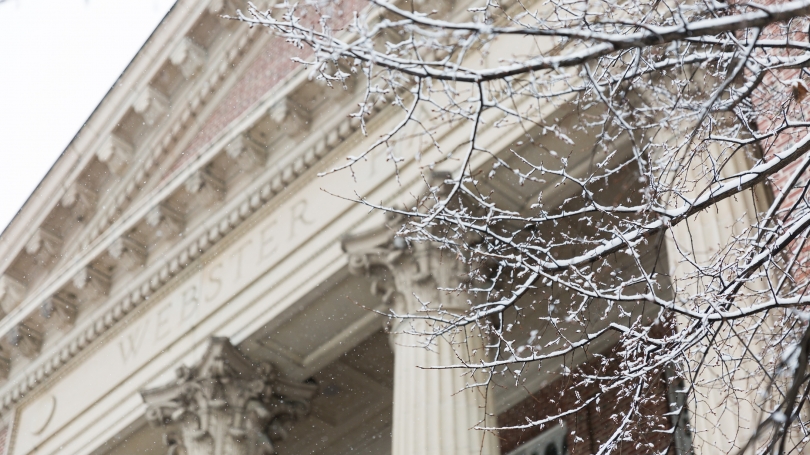
Dartmouth Notifies Early Decision Students of Their Admission
Posted on December 16, 2020 by Susan J. Boutwell
This year saw a record number of early applications, which increased by almost 29%.
Dartmouth today admitted the first 566 members of the undergraduate Class of 2025 through an admissions process, significantly shaped by the pandemic, that has provided unprecedented access for an academically talented, diverse range of prospective students from a variety of backgrounds to learn about Dartmouth.
The number of early decision applications, 2,664, this year increased by almost 29%, the fourth year out of the last five that the applicant pool has reached a new high. Students were notified about admissions decisions at 4 p.m. today.
With COVID-19 keeping prospective students from visiting campus since mid-March, this year has seen a 64% increase in student participation in recruitment events over last year, giving thousands more students an opportunity to learn about Dartmouth through a series of programs initiated by the Admissions Office.
"The jump in applications suggests the effectiveness of our digital recruitment platform, an innovative set of opportunities created by our remote admissions staff. Experiencing Dartmouth in-person is always the ideal, but our online program effectively communicated Dartmouth's enduring academic quality and community vibe," says Lee Coffin, vice provost for enrollment and dean of admissions and financial aid.
In addition to the students accepted early decision, an additional 25 applicants were offered admission on Nov. 30 through the Quest Bridge National Match Program, which connects high-achieving, low-income students from across the country with educational opportunities at partner colleges and universities. They were selected from a record pool of 1,364 candidates who listed Dartmouth as a match option.
The percentage of accepted students from low-income households is almost 26% and the projected percentage of students who are eligible for federal Pell grants is 18%. The percentage of Pell-eligible students (the grants are offered to U.S. citizens and permanent residents from the lowest socioeconomic level) is up from 14% last year and 11% over five years ago.
"At a time when many families are experiencing significant economic and personal challenges, Dartmouth's commitment to meeting the full demonstrated need of all students remains firm," Coffin says.
That enduring commitment comes as increasing the amount of financial aid available to Dartmouth students is a cornerstone of the institution's $3 billion Call to Lead fundraising campaign, which seeks to raise $500 million in new endowed financial aid funding.
According to preliminary financial aid information, 58% of the accepted students have applied for need-based financial aid, tying the percentage of three years ago. Scholarship aid offers to accepted early decision students are projected to total about $15 million, up from $11.2 million at this time last year. The preliminary average scholarship is $62,200, a record high, up from $55,962 last year, an almost 11% increase in the average scholarship for this first round of acceptances.
This year's early decision group includes:
- Students from 44 states as well as Washington, D.C., and Guam. The biggest cohorts are from New York, California, Massachusetts, and Texas. International students hail from 36 nations, with top representation from Canada, China, Brazil, and the United Kingdom; other countries represented include El Salvador, Mongolia, Norway, Somalia, and Ukraine.
- The percentage of accepted students living outside the U.S. is 14%, a new high for Dartmouth.
- Almost 20.5% are ranked first or second in their senior class, also up over past year, and 93% are ranked among top 10% of their classes. Given the uneven opportunities and public health risks in taking standardized tests during the pandemic, Dartmouth implemented a one-year pause this year in its testing requirement and will not publish testing data for the Class of 2025.
- 52% of the early decision group identify as female, marking the third consecutive year in which a majority of early decision acceptances are women.
- Also a new high, 16% of accepted students will be the first in their families to attend college.
- The children of Dartmouth alumni represent 15% of admitted students, the same as last year's percentage.
- 36% of all accepted students are Black, Indigenous, or people of color, as are 41% of U.S. citizens and permanent residents. Both are historic highs for Dartmouth.
The accepted students must confirm their enrollment by Jan. 8. Dartmouth expects to enroll a class of 1,150 students in September 2021. The deadline for applications in the regular-admission cycle is Jan. 2.
"The personal stories of the students in the early decision pool are as dynamic as the pool was gigantic," says Coffin. "The '25s are amazing academic and personal fits for the Dartmouth community, and we are excited to welcome them to the undergraduate community."